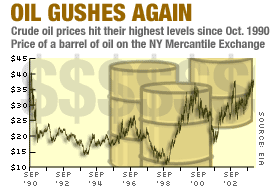NEW YORK (CNN/Money) -
Though oil prices are near 13-year highs, many analysts are preaching calm, saying the U.S. economy and stock prices can withstand the surge -- though inflation could be more of a headache than ever.
On Thursday, for the second day in a row, a barrel of oil for June delivery was fetching more than $39, the highest level since October 1990, when Saddam Hussein invaded Kuwait.

The surge helped push U.S. stock prices lower, as traders remembered the economic havoc high oil prices wreaked in previous decades.
"Investors have a long memory -- in those cases where we've had major oil shocks, overall demand has dried up," said Michael Carty, stock market strategist at New Millennium Advisors. "People are looking towards and fearing a slow-growth, inflationary environment -- stagflation."
Meanwhile, gasoline prices continue to hit record highs. Since most U.S. consumers, whose spending fuels more than two-thirds of U.S. gross domestic product (GDP), don't have much choice but to fill their tanks, higher gas prices could slow other purchases, putting a drag on the economy.
"When combined with the increase in long-term interest rates that has already occurred since their recent lows of mid-March, this could be enough to slow the nascent pickup in economic activity over the balance of this year," Hofstra economics professor Irwin Kellner wrote in an article posted at Economy.com on Thursday.
Some silver linings
Still, oil's current price is far lower, in inflation-adjusted dollars, than during the spikes that followed other oil shocks, such as the Arab oil embargo in the 1970s or Saddam's invasion of Kuwait in 1990.
And oil prices aren't that much higher than they were a year ago. In fact, they've been relatively high for some time, and many economists believe the economy can adjust more easily to steady increases as opposed to sudden shocks.
| Related stories
|

|
|
|
|
"It's a moderate economic headwind," said Jan Hatzius, senior economist at Goldman Sachs. "It takes a couple of percentage points off of the GDP growth rate, but it's not the sort of oil shock that would be required for a much more significant slowdown."
In addition, the economy is in different shape now than it was in, say, 2000, when the late-1990s economic boom was winding down. A surge in oil prices then helped push the economy into recession.
Now, the U.S. job market seems to be in the middle of a turnaround, and many of the world's major economies are strengthening.
"Four years ago, the economy was in a very vulnerable state," said Anirvan Banerji, director of research at the Economic Cycle Research Institute, a private firm that publishes its own monthly inflation gauge. "Right now, the economy's window of vulnerability has slammed shut. Even though oil prices might have some impact on consumer spending, it's not likely to trigger a new downturn."
Inflation still a problem
But higher oil prices will also add to the inflationary forces gathering in the world's economies, which could fuel uncomfortable price gains and eventually inspire the Federal Reserve and other central banks to raise interest rates more quickly.
So far, the Fed and most other U.S. economists have been mainly watching labor costs, which make up the majority of production costs for U.S. firms. A weak labor market and sluggish wage growth have kept those costs down in recent years, making many economists fairly sanguine about inflation.
But some analysts think their colleagues may risk being blindsided by a surge in oil and raw materials prices, which are much bigger factors than labor costs for firms in China, India and other developing nations -- where many of the goods Americans consume are made.
"We are in a situation where we have rising raw material prices, which are very important in China, and a rise in food prices, which are important to Chinese laborers," Banerji said. "That's inflationary, and these costs are being passed around."
Of course, there's always the possibility that oil prices will fall soon. Though there's rampant fear that oil supply is tight and that violence in Iraq and elsewhere in the Middle East could make it tighter still, some analysts doubt that market fundamentals support such high prices.
"Oil prices have been exceeding the most bullish forecasts for the past year and a half, and that's not driven by industry fundamentals, but largely by speculation and fears of a potential supply disruption," said Fadel Gheit, oil analyst at Oppenheimer & Co.
That sounds a lot to Gheit like a bubble -- one that will pop, though there's no telling when.
"It could be a month, it could be a year, but I hope it's not longer," Gheit said. "The longer prices stay high, the more trouble there will be."

|

